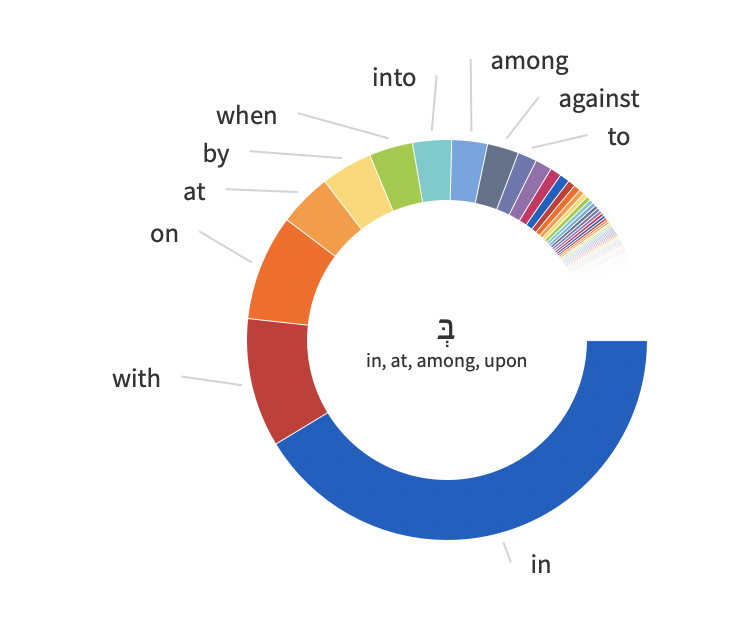Compared to English, Hebrew has very few prepositions, and each preposition has a large number of English targets.
בּוֹ
The preposition used here is ְּב or "b". The composite word is בּוֹ, or "bo", but only the first letter, "b" is the preposition. Attached to the preposition as a suffix is the pronoun "H'u" (3rd person masculine singular) which acts as a pronomial suffix, and the combination of "b" + "h'u" is turned into the compound "bo", which has the semantic range of:
- "in him/it" (most common)
- "with him/it" (common)
- "on him/it" (common)
- "at him/it"
- "among him/it"
- "against him/it"
- "into him/it"
- "to him/it"
and many others.
The preposition "b" occurs over 15,000 times in the bible and has hundreds of different english translation targets, but "in/on/with" are the most common:

That is, "b" should be viewed as a general connector attaching one thing to another, with the idea of the smaller being attached to the larger, and thus one can say that the food is in the stomach or the hair is on the head, etc. And then it is translated based on context and the requirements of English, which demands much more precision than does Hebrew, due to the fact that English has many more prepositions each with a narrower semantic range than what is found in Hebrew.
For example, just looking at Psalm 119, the preposition "b" is used 26 times. Here is a sample of the english targets (using the hyper-literal LEB):
- v45 בָרְחָבָ֑ה "in the wide place", or "freely"
- v47 בְּמִצְוֺתֶ֗יךָ "in your commands"
- v50 בְעָנְיִ֑י "in my misery"
- v46 (בְ֭עֵדֹתֶיךָ "of your testimonies")
- v48 בְחֻקֶּֽיךָ "on your statutes"
- v78 בְּפִקּוּדֶֽיךָ "on your precepts"
- v58 בְכָל־לֵ֑ב "with my whole heart"
- v84 בְרֹדְפַ֣י "against those who pursue me"
- v93 בָ֝֗ם "by them"
- v133 בְּאִמְרָתֶ֑ךָ "by your word"
- v 117 בְחֻקֶּ֣יךָ "for your statutes"
- v 133 בִּ֥י "over me" (another pronomial suffix)
Translating the verse
It should be clear now that there is ambiguity as to how to translate "b". Here are different translations:
LEB: "fire was on it by night"
ESV: "fire was in it by night"
KJV: "fire was on it by night"
NRSV: "fire was in the cloud by night"
Douay-Rheims: "For the cloud of the Lord hung over the tabernacle by day, and a fire by night"
Translation choices
To understand the translation choices here, each translator has to think about the following:
Does the third person masculine singular pronoun in "bo" refer to the construct cloud-of-Yahweh or to the tabernacle?
Does "before the eyes" refer to both the cloud and the fire? If something is happening "before the eyes of all the house of Israel", then it is unlikely to be just inside the tabernacle, where very few Israelis could see, it would be a large public spectacle atop the tabernacle.
Finally, understand that when it is allowed by English and is consistent with the sense of the passage, then odds are that "in" should be preferred as it is the most common target.
So when translators go through the above issues, they will tend to reach different conclusions and thus choose different targets.
